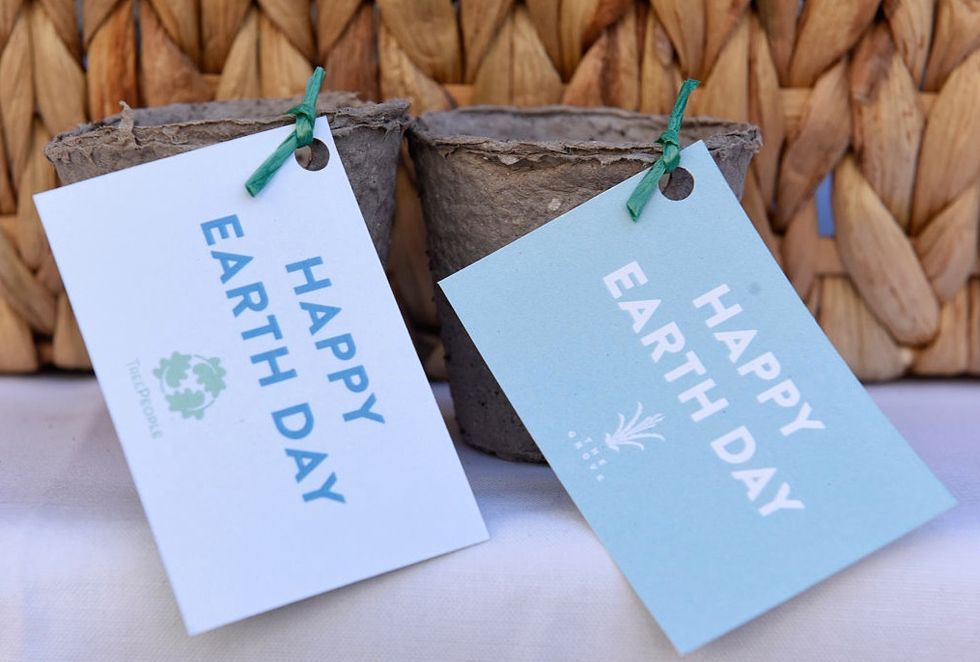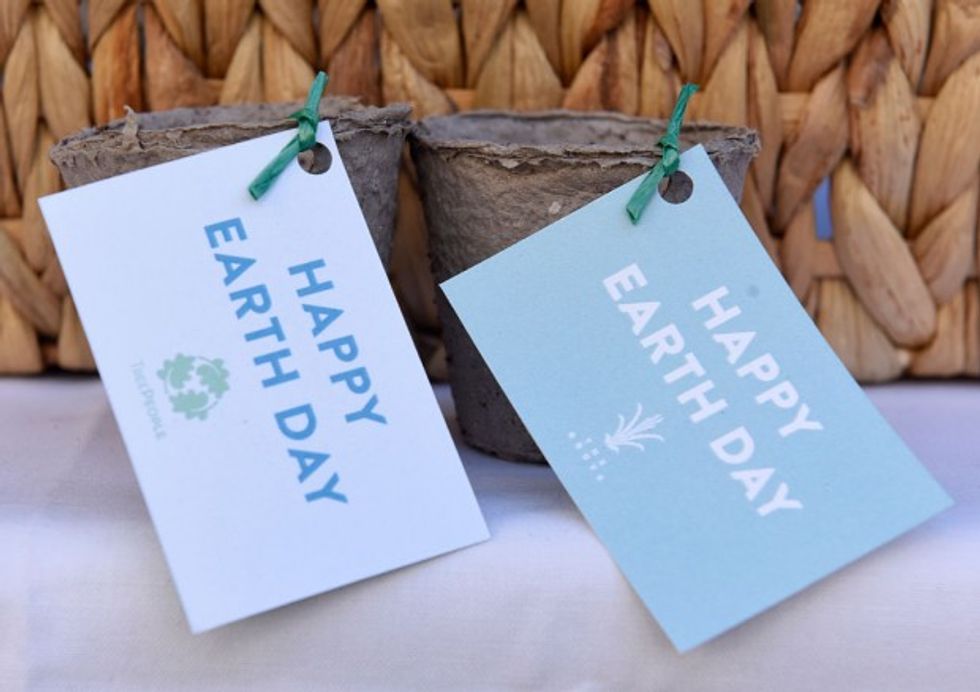
Image source: Vivien Killilea/Getty Images for Caruso Affiliated

Our daycare has these fun theme days one day a week. Future profession, favorite color, silly hat day, etc.
“What’s this week’s?” I ask, as I pick my daughter up.
“Green and blue. For Earth Day!” I heard.
I silently rolled my eyes.

“Should we dress her like an SUV?” I jokingly hollered to my husband as we got her ready.
Calm down, I’m kidding.
All joking aside, I roll my eyes about this not because I don’t care about the world, but because we’ve all be conditioned to care for the WRONG reasons!
From worrying that we’re personally destroying the climate, to actually elevating nature above human life, it spans the spectrum.
And there really are solid reasons to care about our planet - but we’ll get to that in a minute.
For now, let’s think about how the alarmism got started, why it continues today and why we should be questioning it, big time.
1. Modern-day environmentalism got its start with mosquitos.
The insecticide “DDT,” to be precise - and Rachel Carson’s book “The Silent Spring.”
“Silent Spring played in the history of environmentalism roughly the same role that Uncle Tom's Cabin played in the abolitionist movement,” the Environmental Protection Agency (EPA) writes, “In fact, EPA today may be said without exaggeration to be the extended shadow of Rachel Carson.”
Despite documented evidence that DDT didn’t pose the threat to humans she claimed, her book called for a witch hunt on the pesticide and its purported grave danger to mankind.
You know what posed grave danger? The malaria outbreaks that killed millions - all as a result of Carson’s “research.”
In many ways, her book and its use were prophetic of the way that “environmentalism” works. The book slams the scientific method aside and “encourages some of the most destructive strains within environmentalism: alarmism, technophobia, failure to consider the costs and benefits of alternatives, and the discounting of human well-being around the world.”
2. We’ve been duped by the data.
From manipulating temperature readings, to deliberately choosing a stretch of the Arctic where “ice is affected by warmer water brought by the cyclical shifts in a major Atlantic current” scientists have been purposely finagling with data the world round.
Indeed, when you read temperatures using “satellites that orbit Earth, far above the automobile tailpipes, air-conditioning exhaust ducts, and even barbecue pits that distort readings from ground-based thermometers adjacent to these heat sources,” you get a different story.
The Telegraph’s Christopher Booker puts it well: “Any theory needing to rely so consistently on fudging the evidence, I concluded, must be looked on not as science at all, but as simply a rather alarming case study in the aberrations of group psychology.”
It’s simple: if man-made global warming is settled science, then you scientists should have it easy.
Just record the rising temperatures.
3. We’ve only been recording temperature systematically since 1880.
Ok, so we’ve established that we’ve been working with crooked numbers. But let’s assume for a minute that the temperature readings are all on the up-and-up. When you read headlines like “Last year [2014] the hottest in earth’s recorded history,” what immediately comes to mind? Imminent doom, obviously - especially given that “recorded history” goes back some 5,000 years. Unless of course you realize that climate’s “recorded history” really only goes back a little over a hundred years. 136, to be exact.
So, let me get this straight: In a world that this same scientific community claims is 4.5 billion years old, we’re going to deem a theory to be fact based on infinitesimally small sample?
4. The earth hasn’t warmed steadily in nearly 20 years.
OK, but March was the “warmest on record.” Scientists even called the balmy weather “unprecedented.” Unprecedented compared to what? The last 136 years as we discussed in #2? Oh, I’m convinced.
Be that as it may, the scientific community has for years tried to tell us that the world is getting increasingly warmer, and that it’s man’s fault. Well, there IS no warming trend (quite the plateau, actually), and as for man-made change? Skip to #10.
5. Warmer temperatures aren’t bad. In fact, they’re great!
Let’s assume it is warming. Heat is good! It’s not just the better growing conditions and lower energy costs it brings. It fosters longer lifespans, too.
6. The hole in the ozone layer expands and contracts.
Remember when the hole in the ozone layer was discovered some thirty years ago, and we instantly believed it was mankind’s doing? Again, context: we have no way of knowing how long it’s been there. But, since we have been studying it, we’ve learned that the hole “opens and closes and is subject to annual variances, air flow patterns and other atmospheric dynamics.”
7. Arctic ice is up. A lot.
In fact, it grew by a third following a warmer period from 2010-2012 where it shrunk by 14%, leading scientists to the astounding conclusion that ice sticks around when it’s colder, and shrinks when it’s warmer.
In all seriousness though, here’s the most interesting part of the findings:
"It would suggest that sea ice is more resilient perhaps - if you get one year of cooler temperatures, we've almost wound the clock back a few years on this gradual decline that's been happening over decades.”
In other words, what melting that did occur in warmer cycles was remedied by a cyclical shift to cooler temperatures.
8. Stock up on the sweaters; we’re actually headed for cooler temperatures.
Have you noticed the subtle switcheroo? Gone are the days of feverishly talking about “the greenhouse effect” and “global warming.”
Instead, as we’re watching sun activity trend towards cooler temps, we’re now talking about man-made "climate change.”
And that means that as the earth cycles between cooler and warmer, the alarmism gets to keep right on going. After all, when we define it broadly as “climate change,” everyone’s theories win.
9. There are 750 percent more trees on earth than previously thought.
How much is 750 percent more? Trillions. Trillions of trees more than previously thought.
Still, we routinely hear that each year we lose forest acreage equivalent to the size of Panama, and that in 100 years, there will be no more forests left at all.
At the same time, few are bothered to factor in the reforestation that takes place when we harvest lumber - and rarely is anyone bothered to point out that trees die as a result of plenty of natural causes, too.
10. There is absolutely no settled science that proves that man is responsible for the climate.
Politicians can peddle this as much as they like, but where’s the proof? Where’s the undisputed correlation between man and climate? The temperature models have been fudged - and we’re supposed to trust implicitly in what those same scientists claim is the cause?
Think about these last 10 points - did you notice a pattern? Alarmist claims or even falsified information - proven wrong time and again.
Call me crazy, but that’s no way to operate. Indeed, we HAVE been conditioned to care for all the wrong reasons.
Look, I care about the earth, because it’s just common sense. Nobody wants to live in a cesspool.
But most of all, I do it out of thankfulness. God put us on this earth to be stewards, not wasters and abusers.
Let’s give that thought process a try for a change.
Mary Ramirez is a full-time writer, creator of www.afuturefree.com (a political commentary blog), and contributor to The Chris Salcedo Show (TheBlaze Radio Network, Saturday, from noon to 3 p.m. ET). She can be reached at: afuturefree@aol.com; or on Twitter: @AFutureFree
–
TheBlaze contributor channel supports an open discourse on a range of views. The opinions expressed in this channel are solely those of each individual author.